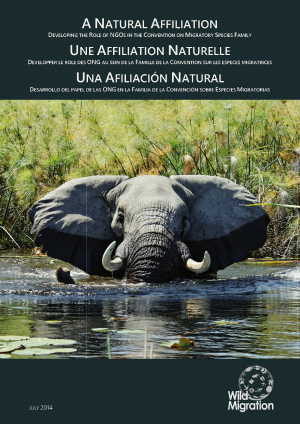Crucial Civil Society Resolution to be decided at CMS CoP112nd November 2014  CMS CoP11 will soon deliberate many important conservation issues, including protecting polar bears, Cuvier's beaked whales, saker falcon, African Eurasian landbirds and sharks. Wildlife crime and cetacean culture will be some of the overarching topics, which will also include a crucial Resolution on Enhancing the Relationship Between the CMS Family and Civil Society CMS CoP11 will soon deliberate many important conservation issues, including protecting polar bears, Cuvier's beaked whales, saker falcon, African Eurasian landbirds and sharks. Wildlife crime and cetacean culture will be some of the overarching topics, which will also include a crucial Resolution on Enhancing the Relationship Between the CMS Family and Civil Society
This Resolution is the manifestation of the Civil Society Dialogue project many NGOs were involved with during CMS CoP10. The outcomes of the Civil Society Dialogue were further developed through the review A Natural Affiliation.
The Primary findings of the A Natural Affiliation review were that:
- Government resource and capacity for CMS implementation is low;
- NGOs believe that the CMS Family is important; and
- NGOs consider CMS a small part of their conservation programs (less than 10% of their conservation related work time), yet they would increase their engagement if the right ‘dynamic’ is created.
That 'dynamic' might include:
- developing a more consistent and strategic dialogue with NGOs so that they can better plan their work to support CMS;
- developing a mechanism to enable NGO funded or facilitated work to be formally and consistently reported across the CMS Family; and
- exploring formalized models for increased NGO involvement in CMS processes.
These suggestions need further exploration, which is the purpose of the Civil Society Resolution.
Civil Society Resolution IntentionOver 100 NGOs contributed to A Natural Affiliation. This represents a significant NGO voice about the CMS Family.
Responding directly to the reviews findings and recommendations, the Civil Society Resolution intends to provide a pathway for the NGO community to consider options and opportunities for how NGO engage with the CMS Family in the future. These are captured in the style of last year's Global Ministerial Environment Forum decision as:
- Mechanisms to enable NGO facilitated work to be formally and consistently reported across the CMS Family;
- Models for further NGO involvement in CMS processes such as Ramsar's International Organisation Partners; and
- Modalities for further strategic engagement with NGOs to provide implementation and capacity building expertise in key regions.
The operative paragraphs are also designed to ensure that whatever the NGO community produces will be presented to the Standing Committee and can be brought - by NGOs - to CMS CoP12. Risks to the Civil Society ResolutionSome CMS Parties may resist the Resolution's intent. We would repond by saying that NGOs are the lifeblood of much of the work that is done within the CMS Family, and that exploring the areas described by the Resolution will uncover if and how we might do more.
Other CMS Parties may suggest that Resolution's essence is captured well enough in Switzerland's Resolution on Synergies and Partnerships. While Wild Migration inherently supports the Synergies and Partnerships Resolution, unless the ability for the NGO community to explore options and present these to the CMS process are reflected, Wild Migration would strongly argue the intent of the Civil Society Resolution is not captured in in the Synergies and Partnerships draft.
Wild Migration believes that the Civil Society Resolution should stand on its own merit, as an important and positive signal from the CMS Parties to the NGO community.
| 










